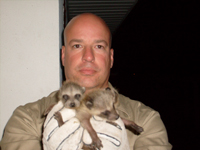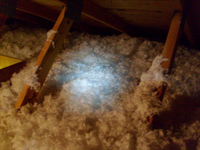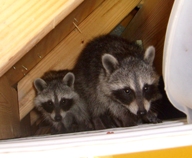| |
|

727-710-0373
Serving
the entire Tampa Bay area
Click
here for free estimate
Raccoons
in your attic?
Raccoon females
love attics for raising their
young. We specialize in Tampa raccoons in attic.
A common way in
your attic is tearing off a piece
of soffit. Raccoons are extremely
strong.
Some signs of raccoons
in your attic are loud thumping noises, scratches
and vocalizations of the babies.
Baby raccoons, usually numbering
3-5, have a chattering noise that
can usually be heard outside under
your soffit/eaves or in your ceiling.
Once in your attic
a raccoon can cause extensive
damage. Destroying ductwork and wiring. While nesting they bring
food products that will collect
and rot. They will also defecate
and urinate.
The greatest problem
with raccoons is disease.
Having a raccoon
removed from your attic or home
is not a job for a homeowner. Give
us a call and we will send out
an expert to solve
your raccoon control problem.
Call
today!
727-710-0373
|
Raccoons in attic
The raccoon (Procyon lotor) is a stocky mammal about 2 to 3 feet long and weighs 10 to 30 pounds. It is distinctively marked with a black "mask" over the eyes and is heavily furred with alternating light and dark rings around its tail. Raccoons are active year-round but may take cover in dens during periods of severe winter weather.
BIOLOGY AND BEHAVIOR
Raccoons prefer wooded areas near water and in natural habitats. They den in hollow trees, ground burrows, brush piles, or rock crevices. This nocturnal animal adapts extremely well to urban and suburban environments, where it often dens in backyards, beneath decks, or in accessible outbuildings. Attics, chimneys, and the spaces beneath houses are also used as dens if access can be gained. Because they are active mostly at nighttime, raccoons are often present but may go undetected for some time.
Raccoons are omnivorous, eating both plants and animals. Plant foods include all kinds of fruits, berries, nuts, acorns, corn, and other types of grain. Animal foods include crayfish, clams, fish, frogs, snails, insects, turtles, rabbits, muskrats, and the eggs and young of ground-nesting birds, including waterfowl. In urban settings, in addition to feeding on backyard fruits, nuts, and vegetables, they scavenge from garbage cans and compost piles. Pet food left outside overnight ranks high as a food resource and then, of course, some people deliberately provide food for raccoons.
Young are generally born in April or May, but earlier and later litters are not uncommon. Litter size ranges from three to six young, averaging about four. Family groups usually remain together for the first year; the year-old young begin to assert their independence the following year when the new litter arrives. Because of the availability of food and den sites, urban and suburban raccoon populations can become very large.
DAMAGE
Damage to gardens may be relatively minor compared to the potential damage a raccoon can do to a house. Females in search of nesting sites may rip off shingles, fascia boards, or rooftop ventilators to get into the attic. Once inside the attic, insulation on walls may be torn up and displaced, and insulation on heating and air conditioning ducts may be ripped off and destroyed. Raccoons may begin using an area of the attic for a latrine, and the ceiling beneath may become stained with urine, accompanied by an objectionable odor. Ectoparasites may infest the attic and migrate to other parts of the house. Uncapped chimneys are often used as den sites, as are spaces beneath porches and decks. Doors covering crawl spaces are sometimes damaged in an effort to den beneath the house.
Raccoons are known to carry a number of diseases and internal parasites. The raccoon roundworm, an infection spread to people by the accidental ingestion or inhalation of roundworm eggs from raccoon feces, has caused increased concern in recent years. Roundworm infection can cause serious disabilities, and young children are thought to be most susceptible. Raccoons are also carriers of rabies.
|
|
|

Raccoon
babies
Florida native licensed nuisance wildlife trapper. Let
me help you with your raccoon in attic. |
| 
Raccoons
love a nice warm, dry attic with
plenty of insulation for nesting
material.
|


|
|